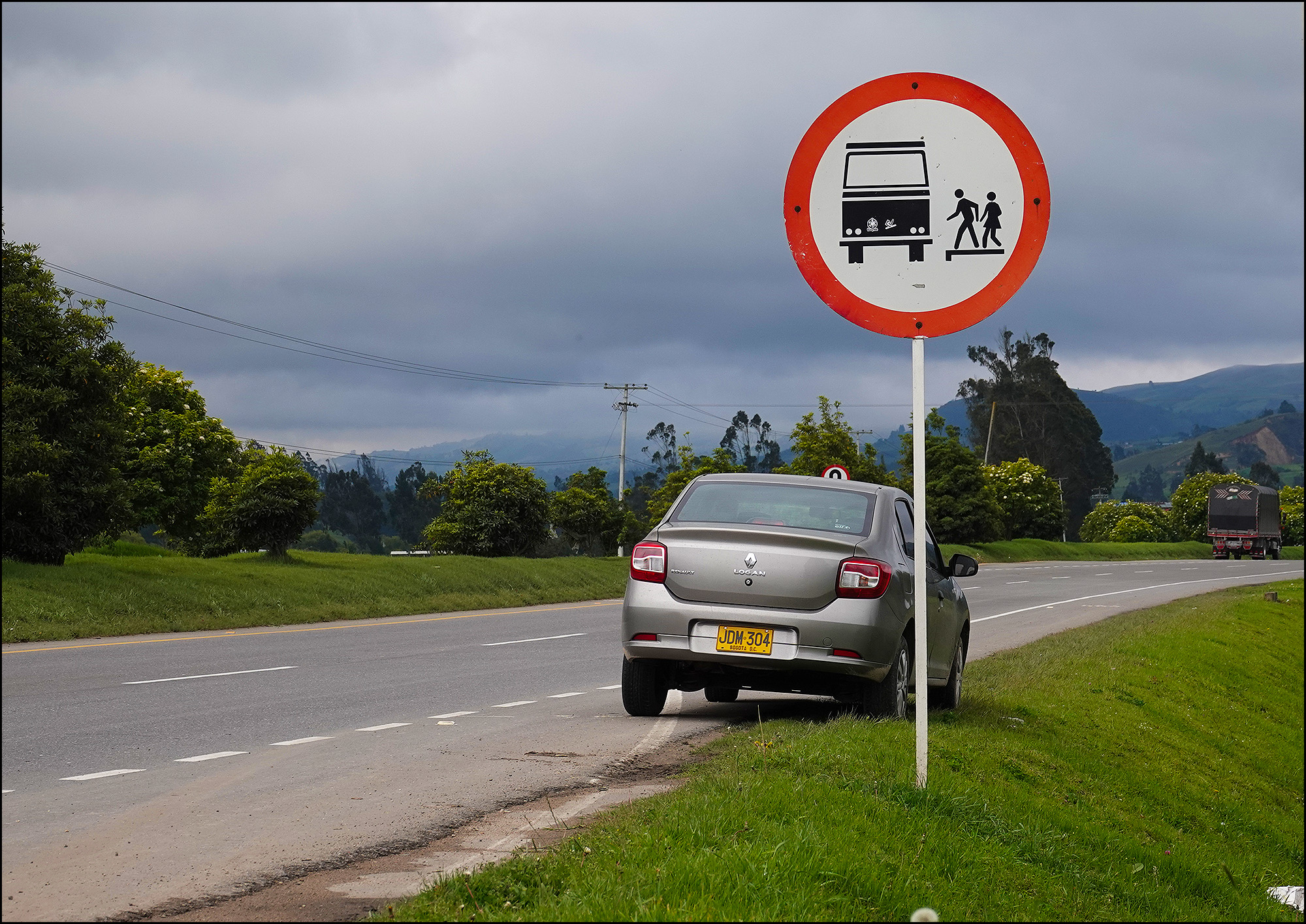Earlier in the week I wrote about my first day in Colombia, but there hasn’t been much since then. The reason is that going places in Colombia takes a lot longer than you expect, which means I rarely got back to my hotel in Bogotá before 9 or 10 at night. At that point, I just wanted to get a little something to eat and then get to bed.
But now I’m home and recovered, so let’s continue. Monday was—well, not the highlight of the trip. My plan, if it can be dignified with the word, was to drive north, south, west, and east of Bogotá in the four days I had. That meant Monday was north day, so off I went, heading up the Autopiste Norte in the direction of Villa de Leyva. About halfway there I drove past the town of Chocontá and pulled off the road to take a quick picture of something.

The train station at Chocontá.
Avis had rented me a Renault Logan, the cheapest car they had. It was about what you’d expect: horsepower similar to your average lawnmower and a shifter that made jello seem solid. But it was a perfectly serviceable car and it was kind of fun driving a stick for a while. But as cheap as it was, it turned out the car had a great security feature: it automatically locked itself after 30 seconds. It did this even if the key was still in the ignition.
You can see where this is going, right? I stepped out to take a quick picture, didn’t bother taking the keys with me, and 30 seconds later I heard a loud beep. I. Was. Screwed.

My car, with the keys safely inside.
I was about half a mile north of town, so my first thought was to walk there and see if I could find an auto mechanic who would come out to jimmy the door. I found three or four places that seemed vaguely car-related and tried to pantomime my problem, but no dice. No one there spoke English, I spoke no Spanish, and my Charades skills were of no use.

One of the streets in lovely Chocontá.
Now, Avis had of course given me a number to call for roadside assistance. Unfortunately, it was in the car. As a backup, I figured I could look up the number on my phone. Unfortunately again, despite having purchased a 10-day international data plan from T-Mobile, my phone wouldn’t connect to the internet. So I did the only thing left: I phoned a friend. After a few tries I found someone at home back in Irvine who agreed to research the number for Avis roadside assistance in Colombia. Avis USA was no help, but eventually he found a number for the Avis counter at Bogotá airport, where I had rented the car. There, I finally made contact with someone after pressing 2 for English. She tried to open my car via GPS, but my Logan wasn’t advanced enough to have that feature. Instead, after going back and forth for a while, I was given to understand that someone would come by, but since I was so far outside the city it might be a few hours.
Luckily (relatively speaking) the weather was nice and it didn’t rain. The Avis assistant called me back several times to make sure I was still OK and to ask if the technician had come yet, so hooray for Avis Colombia. Eventually, a guy drove up on a motorcycle and opened my car. That was pretty interesting, and I wish I’d taken pictures. First he slid a black plastic sheet into the door jamb, and then pumped it up with a little hand pump. This pushed the door slightly away from the body of the car and allowed him to stick a flexible little claw inside the car. After a minute or two he got it solidly fastened onto the door lock, tightened the claw, and pulled it up. Voila. I was back in business.
Then I made my second mistake. It was still only 5 pm, so I figured I’d continue north for a while. Why not? I ended up in Tunja, and if you’re ever planning a trip to Colombia this is an absolute must-miss city. It’s just a mid-sized little industrial town with absolutely nothing interesting to see. I got lost wandering around Tunja for a while, stopped at a grocery store for a bag of potato chips, and headed home.

The journey home.
I finally got back to Bogotá around 10, got lost several times trying to get to my hotel—more about that later—and finally got back to my room around 11. And that was my day.
BONUS FUBAR: Back at the hotel, I called T-Mobile to find out why I couldn’t connect to the Internet. It turned out that I just needed to reboot my phone. I sure wish I’d known that right from the start.
NEXT: Tuesday in Colombia! Things can only get better, and they did.
LATE UPDATE: A Colombian acquaintance informs us that all Colombian cars have an automatic locking system and that she has been locked out of her car on occasion herself. I’m not sure if this makes me feel better or not. Either way, though, this is definitely something that car rental companies should tell unsuspecting tourists.













